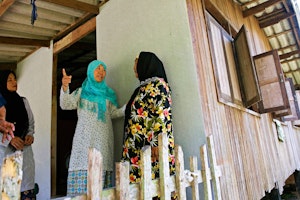Bring Europeans with Mental Disabilities Out of the Shadows
By Judith Klein
Bulgarian journalist Yana Buhrer Tavanier recently launched a website featuring the results of four months of investigative journalism, conducted mostly undercover, in ten institutions for adults with intellectual disabilities and mental illnesses in Bulgaria, Romania, and Serbia. As highlighted in a promo video on the website, conditions in these institutions are appalling.
People with disabilities should not be locked away. As we have shown throughout the region—in Croatia, Moldova, Kyrgyzstan, Macedonia—with support from their governments, people with disabilities can easily be integrated into society.
I have two theories for why the segregation of people with mental disabilities, which is a very severe human rights violation in itself, is allowed to continue. One theory is that society as a whole fails to make the connection between the people incarcerated in institutions and what we expect for ourselves, our family, friends, and fellow citizens. This is because, as Buhrer Tavanier’s article portrays so movingly, the residents of these institutions are systematically dehumanized:
Residents are not being treated so much as controlled. Many are gradually destroyed by constant exposure to harmful, high-dosage medication. People do not leave their beds for years. Children are being kept tied down for most of the time. Living conditions are appalling beyond imagination. And the process of deinstitutionalization is as phlegmatic, that death still is the only reliable way out.
They are dehumanized by government practices, by staff in the institutions who have no time to treat them as individuals, and by the general public who prefer not to think about this issue. I think of this as the “us and them” mentality. People with mental disabilities are regarded as “less than human,” an inferior form of being. Couple this with the widespread and ingrained stigma and prejudice against them. The result: large, remote institutions where people spend their lives, dying of abuse and neglect, marginalized and forgotten. The bitter irony of this theory is that similar treatment of animals would be an immediate public scandal. This cannot be right.
The other theory is there is a lack of real political will in Central and Eastern Europe to take action necessary to end this appalling practice. As Buhrer Tavanier notes:
Two out of three governments showed no readiness to talk about policy. The recently elected Bulgarian government was the only one ready to answer questions – but in writing … The European Commission has said it may suspend payments under the European Social Fund in case of serious irregularities in Bulgarian and Romanian institutions. As for Serbia, many important voices insist that the EU must demand a better human rights track record from future candidate countries. However, in practice, Brussels has been turning a blind eye to such abuses for years.
In Central and Eastern Europe, while “deinstitutionalization” has become a popular turn of phrase in policy circles, the truth is that not one government in this region, including the new EU member states, has concrete plans or financing mechanisms to develop networks of community-based alternatives to institutions, which are an absolute prerequisite for successful de-institutionalization. Alarmingly, new institutions for people with mental disabilities continue to be built across the region, often with European taxpayer funding.
Clearly, there is much work to be done. Thank you, Ms. Buhrer Tavanier, for bringing people with mental disabilities in Central and Eastern Europe out of the shadows.
OSI will continue its work to enable them to be reunited with their local communities, where they have always belonged.
Until March 2019, Judith Klein was a senior adviser to the Open Society Public Health Program.

